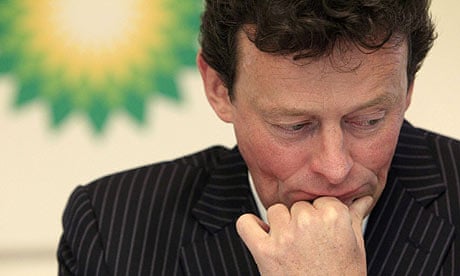BP chief executive Tony Hayward is preparing to step down within the next 10 weeks, according to a report this morning, as the embattled oil giant announced plans to sell $7bn (£4.6bn) of gas assets for its Gulf of Mexico clean-up fund.
Hayward was heavily criticised for his reaction to the Deepwater Horizon disaster including the statement, "I want my life back", that led to accusations of insensitivity. The beleaguered chief executive may get his wish soon, amid a growing expectation that the 53 year-old will announce his departure in late August or September.
Quoting sources close to BP, the Times reported that his exit is expected before 1 October if the ruptured well is sealed and his exit could be announced alongside a new strategy being hammered out for the group called Future BP. An insider said Hayward's departure formed part of the group's defence against any attempted buyout by ExxonMobil or Royal Dutch Shell.
Robert Dudley, the American who runs BP's Gulf Coast Restoration Organisation, has been heavily tipped to succeed Hayward.
A spokesman for BP, however, told Reuters that Hayward "has full support from the board and will remain in place".
Speculation about Hayward's future coupled with news about disposals by the oil giant, helped shares in BP open up 10.55p at 398p, a rise of almost 3%.
The Gulf of Mexico spill, which could be discharging 70,000 barrels a day, has featured high on the agenda in a meeting between Barack Obama and David Cameron in Washington this week. Cameron said yesterday that BP should not be blamed for the "completely wrong" decision to release the Lockerbie bomber, Abdelbaset al-Megrahi, amid reports that the oil company pushed for his transfer to Libya in a bid to ease access to oil fields.
Obama effectively pronounced sentence on Hayward and his less than convincing public performance last month when he said: "He wouldn't be working for me after any of those statements."
Standoff
A standoff between the company and the US government has developed over the past few days, after BP installed a new containment cap on the ruptured well ahead of its permanent plugging next month. While the cap seems to have stemmed the flow, there is growing anxiety among government officials about the continued seepage of hydrocarbons from the seabed.
The government fears oil may be leaking below the surface, and that if left unchecked this process could cause graver problems, including the collapse of the well.
Earlier in the week Thad Allen, the official appointed by Barack Obama to lead the federal response to the disaster, warned BP that the US government reserved the right to reopen the well if worries about seepage intensified.
The spill has forced the company to look at asset disposals to raise cash to pay for the rising cost of the clean-up, which has already reached almost $4bn.
BP has already agreed to set aside $20bn to pay for the clean-up and has revealed plans to sell $10bn worth of assets. It has taken a significant step towards hitting that $10bn target by announcing the sale of onshore gas assets in the US, Canada and Egypt to US-based company Apache in a $7bn deal.
The assets represent 2% of BP's reserves and produce an estimated 331m cubic feet of gas a day. The first $5bn of the purchase price will be paid at the end of the month.
Steven Farris, Apache's chief executive, said: "We seldom have an opportunity like this in one of our core areas, let alone three."
BP added that it will sell most of its assets in Vietnam and Pakistan, which are valued at $1.7bn. One analyst said BP could reach $10bn "quite easily" by selling non-core assets that would have been sold within five years anyway. Other potential sale assets include a $9bn stake in Argentina's Pan American Energy and fields in Colombia and Venezuela.
Roll call of BP assets for sale
Vietnam
The company is "exploring divestment options" for its interest in the Nam Con Son gas project - one of Vietnam's largest foreign investment projects. According to UBS the stake is worth $966m.
Pakistan
BP hopes to sell its upstream assets in Pakistan, which comprise a number of producing fields and exploration blocks in the southern Sindh province. They are worth $690m, UBS estimated.
Alaska
BP is said to have been in talks with potential buyers for its 26% stake of the Prudhoe Bay field in Alaska, the largest oil field in North America. BP's total Alaskan assets are estimated to be worth about $12bn, UBS said.
Russia
BP's delicate balance of power with its partners in Russian joint venture TNK-BP means it cannot reduce its 50% stake without jeopardising its bargaining strength and analysts do not expect an outright sale.
Argentina
BP holds a 60% stake in Pan American Energy, which owns Cerro Dragon, one of the largest shallow oil and gas fields in southern Argentina.Once deemed near the end of its life, it now sets new output records. Reserves are 1bn barrels of oil equivalent. BP's stake is estimated to be worth $9bn.
Colombia
The Cusiana and Cupiagua fields, discovered by BP in the early 1990s, saw production peak in 1999. BP has just handed operation of Cupiagua to state oil company Ecopetrol. It continues to operate Cusiana. The Colombian assets are estimated to be worth $1bn-$2bn.
Venezuela
BP has minority stakes in two exploration and production joint ventures with state-owned PDVSA. Its Venezuelan assets are estimated to be worth $850m to $1bn.
Refineries and retail stations
Reports have suggested BP could spin off its refineries and retail stations but industry sources said this was unlikely. BP has whittled down its portfolio of refineries in recent years to a core of high-grade facilities integrated into broader operations such as trading and upstream production.

Comments (…)
Sign in or create your Guardian account to join the discussion